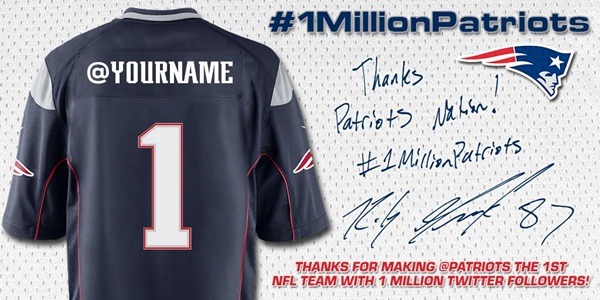This has been another amazing season for that NFL dynasty known as the New England Patriots. After soundly defeating the Lions yesterday, Tom Brady, Bill Belichick, and company now sit at 9-2 on their way to another exciting round in the playoffs.
So what could go wrong?
The Patriots’ social media initiative, of course. It seems like a week doesn’t go by without some mega brand screwing up royally in the social space. Lori Lewis writes about these snafus regularly in All Access’ “Merge” column, but the degree to which brands that should know better somehow misjudge their social efforts is still mind-boggling.
So when Boston.com reported that the vaunted New England Patriots joined all these other misguided brands on Twitter earlier in the month, it was not really a surprise. That is, until you look into how they did it.
Like many social initiatives, the Patriots started out with a fan-friendly promotion. To thank their one million Twitter followers, they created the ability to embed fan Twitter handles on the back of a Patriots jersey, and then auto-blast them out in the social space.
That seemed innocent enough until a smartass “fan” decided to try a variety of fake Twitter handles, and of course one that contained the N-word was created. Obviously, the lack of filtering and a system that auto-Tweeted these virtual jerseys goes right to the heart of a promotion that was simply not well thought out.
And it all ended up with red-faced Patriots executives who must have wondered how this kind of thing could happen, followed by the typical mea culpa tweet:
So instead of just treating this like another in the dozens of other pathetic examples of big brands messing up their social activities on the global stage, I started thinking about how this kind of thing can continue to happen – week after week.
And it dawned on me.
These brands put people in charge of their social efforts who are proficient at using computers, websites, dashboards, and mobile gadgets. But that doesn’t make them good strategists or crafty practitioners.
Epic social fails have become infamous, because brands like Southwest Airlines, Kmart, McDonald’s, and yes, the Patriots are lacking a SMPD – a social media program director.
That’s because great PDs sweat the small stuff. They don’t let this kind of stuff happen. They approach every initiative, campaign, promotion, and event with one overriding thought in mind:
What could possibly go wrong?
 And then they reverse-engineer the idea to eliminate every mistake they can think of.
And then they reverse-engineer the idea to eliminate every mistake they can think of.
Is there proper security? Is there a way the promotion could be hijacked by a snarky fan? Could the listener voting be corrupted? Is there a delay system in place to catch any possible obscenities or slip-ups? What if none of the keys starts the car? What are the chances another station will launch something similar or one-up our promotion? Have we run everything by the legal department?
Great PDs play pepper with themselves and their staffs to consider the possibilities of where promotions and events can run astray – and stop them before they get on the air.
In social media, seat of the pants ideas are generally not road-tested, bullet-proofed, or thought through to look for leaks, kinks, problems, and speed bumps. Too often, the scariest four words lead off the social idea – “Wouldn’t it be cool?” – without the proper vetting.
Great PDs have an important quality – paranoia – that serves them well.
That’s because their favorite four words are:
Sweat the small stuff.
- What To Do If Your Radio Station Goes Through A Midlife Crisis - April 25, 2025
- A 2020 Lesson?It Could All Be Gone In A Flash - April 24, 2025
- How AI Can Give Radio Personalities More…PERSONALITY - April 23, 2025






I totally disagree. The PD paranoia is what has stiffled radio creativity. They are so paralyzed by the possibility of failure that nothing changes and they continue to follow the same “radio rules” and do everything just like it was done 20 years ago. New media thinkers try something, and if it fails, apologize, and try something else. That is what breeds Inovation and creativity. Ready, fire, aim.
Ric, I understand your POV and I’m not arguing against experimentation or even the idea of “fail fast.” But some of these snafus are damaging to brands and aren’t made up for with a shrug and “My bad.” That was the distinction I was trying to make. Be creative, but think it through. Thanks for commenting.